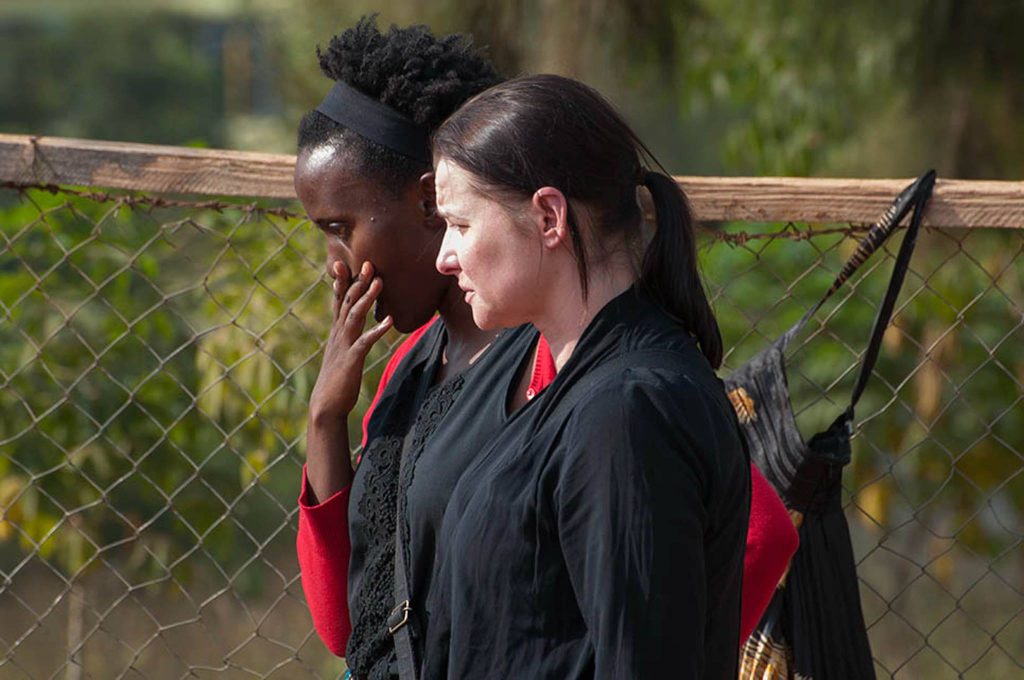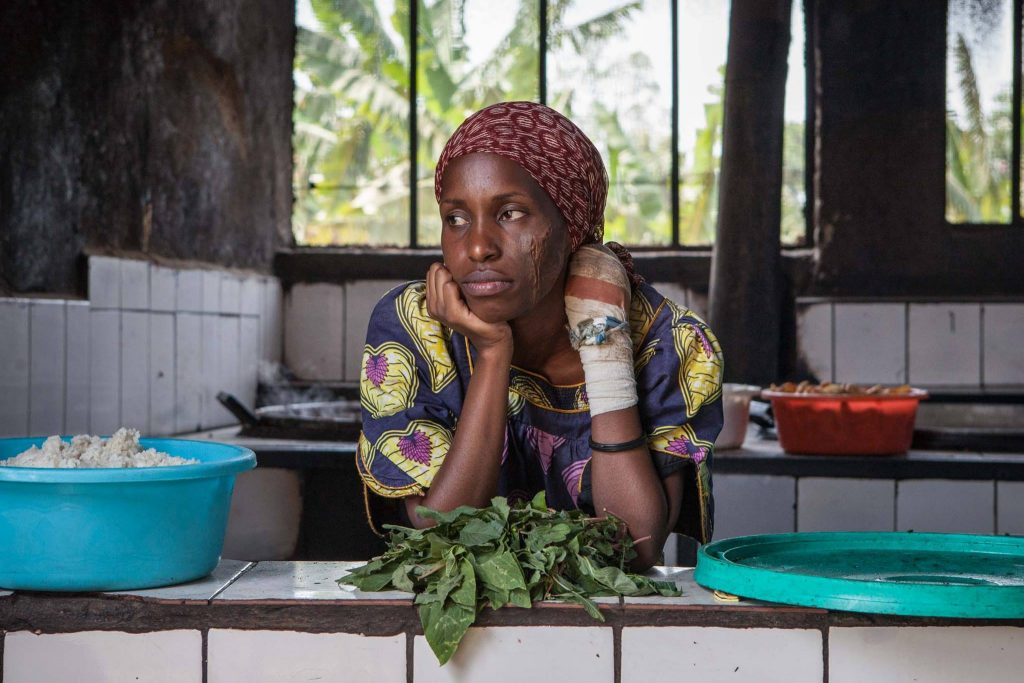NEWS
03/07/2017
There Are No Happy Endings After Genocide
The film begins in 1994 in Rwanda. Ethnic cleansing is underway. Over the course of three months, a million of Tutsi – two thirds of the entire Rwandan Tutsi population – will have died as the world watches in silence. Claudine’s family is murdered during the first days of the genocide. She somehow manages to escape. Anna, an ornithologist from Poland, her father’s friend, risks her life to help the girl escape Rwanda. Both women are emotionally scarred and can’t seem to go back to living a normal life. Anna quits her job and holes up in the country. Claudine ends up at a refugee center, where she tries to commit suicide. Their paths cross again when Claudine is forced to leave the refugee center. She moves in with Anna, learns Polish, and starts helping her around the house. Years pass. The lives of both women seem to tick away at a leisurely pace, but they both know that the only way to heal the Rwandan wounds is to go back to Kigali. Meanwhile, news arrives that Claudine’s cousin survived the genocide, which sends her suppressed homesickness flooding back. The women decide to go to Rwanda to find Claudine’s cousin and the bodies of her murdered family.
The film will premiere in the main competition of the Karlovy Vary International Film Festival on 4 July 2017.
Magdalena Żakowska: Where did it all begin?
Joanna Kos-Krauze: We were reading Wojciech Albiński’s short stories. One of them, “Excuse Me, Has Anyone Here Committed Genocide?” takes place in an unnamed African country in which two tribes coexist. Obviously it’s about Rwanda, but the story was somewhat transformed by the author. In reality, Wojtek has never visited Rwanda. This inspired us to go there in 2006. We decided to see the country in which the story we wanted to tell is taking place. A year later, we visited Rwanda again. After that, I returned several times on my own. Krzysztof was too ill to make the journey. We had to live in Africa for a while, 6 years total, to understand that an older white man and a young black girl, like the ones in Albiński’s story, constitute a bad, post-colonial narrative. It’s a stereotype. We didn’t want to build our story on such a foundation. Didn’t want it to become a love story set against the backdrop of a genocide, as our American script doctors suggested. They wanted an African “Bodyguard”. Besides, we thought that women were more interesting.
How so?
I don’t know. More complex? Unpredictable? Krzyś thought that all great cinema – Haneke, Almodovar, von Trier – is about women. And that there’s definitely not enough such heroines in Polish films.
Were you already then, at this early stage, aiming to make a film about mourning?
Yes. It was before “Aftermath”. We were circling the topic of the Holocaust, we thought that the world needed such a film. It was something of a premonition, I think only Kapuściński openly wrote that globalization reignites nationalisms, which can be dangerous. Then the economic crisis hit, we had difficulty locking down our budget, our American co-producers backed out, and so the project was shelved. And then suddenly, in 2012, we went to the Era New Horizons festival, and something clicked into place. We saw a lot of different, brave films – that festival is always filled with inventive works that go far beyond commerciality. It’s the sort of cinema that morphs into a philosophical treatise, or an essay. Which is very important to me, because when I hear about the three-act film structure, I start seeing red. We had many conversations with Bela Tarr and Kuba Duszyński at that festival, and a new space opened up in our heads. We decided to rewrite the script yet again, focusing on the key question: how do you go on after a genocide?
In the opening and closing credits, you are listed as co-directors. But by the time you started shooting “Birds…” Krzysztof was already very ill. He only spent a couple of days on the set.
But we wrote the script together. Krzysztof took part in the entire preparation. We also had a shared vision of what the film should look like. We both knew that he wouldn’t be able to go to the shoot in Rwanda, but we hoped that he would be present during photography in Poland. In the end, he resigned after 6 days. But it is as much his film as it is mine. Certainly, from directing to editing, I made this film without him. But we had worked on it together for 6 years before that. During the production of “Birds…” we also lost Krzysztof Ptak. But I feel, and I won’t be persuaded otherwise, that he is the principal cinematographer on this film. Even though he shot probably about as much as Józefina Gocman and Wojtek Staroń. But before that, he had worked on the film for 6 years, building its technological and artistic concept. It was thanks to him and his brave ideas that we were even able to make this movie in the first place. Our budget was 5.3 million. Experts said that making this film on such a budget is an impossible feat. So his contribution is invaluable. Was I supposed to frame their names in the end credits? Mark them with a cross? No.
But isn’t it true that following Krzysztof’s death, this film also references a different kind of mourning? Your mourning? That its nature has changed?
No. No changes were made to the script. Everything is just the same it was. Every piece of dialogue is in place. Maybe we were anticipating what would happen when we were writing it.
Don’t you feel that the film lacks hope?
You think it does? I think there is hope in it. Much more than in, say, “Papusza”, which showed a world that no longer exists. That is irrevocably lost. This world is being reborn. You won’t find any happy endings here though. There are no happy endings after genocide.

BIRDS ARE SINGING IN KIGALI dir. Joanna Kos Krauze, Krzysztof Krauze
Did you participate in exhumations?
Yes. At first we wanted to show them, because they are still taking place. The number of mass graves in that country is staggering. We managed to obtain from the Rwandan government a permit to film the places where the bodies of the victims were buried. But the moment I got that permit, I realized that I can’t show it in the film.
Why?
Because it’s not fair to the victims. These are tortured bones. Not a single person there died a dignified death. Quartered, mauled, raped… the scope of violence that accompanied this genocide was enormous. Each of these bodies signifies someone’s life, someone’s degradation, someone’s suffering. Nearly every Rwandan citizen was either a victim or a murderer. The genocide touched everyone. We always had a psychologist specializing in trauma on set. We knew exactly who on our crew was in the Interahamwe [Hutu – ed.] militias, who was a victim and suffered unimaginable – from our perspective – things. All of this took place just 23 years ago. I couldn’t use these bones for the sake of a movie.
You made this decision after Krzysztof died.
Yes. Maybe that had something to do with it. Maybe it hit too close to home? Maybe it was the wrong choice to make, artistically, but I couldn’t force myself to do it.
On the contrary. This film is incredible precisely because it talks about genocide without ever really showing it – which doesn’t lessen its horror in any way.
There’s something unethical about reenacting scenes of genocide. Claude Lanzmann wrote about it marvelously. Meanwhile, Theodor W. Adorno asked whether it was even still possible write poetry after the Holocaust. That was an important question for us. We had to find our own language to tell this story. There is but one scene, the murder of Claudine’s father. But it’s very restrained. I knew there was only so far I could, or wanted, to go. And I would never cross this line.
You can’t see the perpetrators’ faces in that scene.
Showing their faces would be disingenuous. An atrocity of this magnitude doesn’t have a face.
As I was watching your film, I found myself wondering if Eliane Umuhire, who plays Claudine, is Tutsi or Hutu. Is that racist?
From their perspective it is. In Rwanda asking such questions, returning to these pre-genocidal tribal divisions, you get you sentenced to 25 years of prison.
Your film talks more about the results of genocide than it does about genocide itself. It asks the question how to go on living after such a thing, whether it is possible to ever come out of mourning. But I also got the impression that it is very personal – that it talks about both Rwanda, and your own personal mourning.
Certainly. I was looking for this kinship in mourning. And suddenly realized that being able to die in your own bed, surrounded by friends and care, is a great privilege. Even in today’s world. In Rwanda I realized just how big a gift it is to die in a dignified way.
Interview by Magdalena Żakowska (translated by Wojciech Góralczyk)
official website of “Birds Are Singing in Kigali”

Learn about “Birds Are Singing in Kigali” screenings in Karlovy Vary